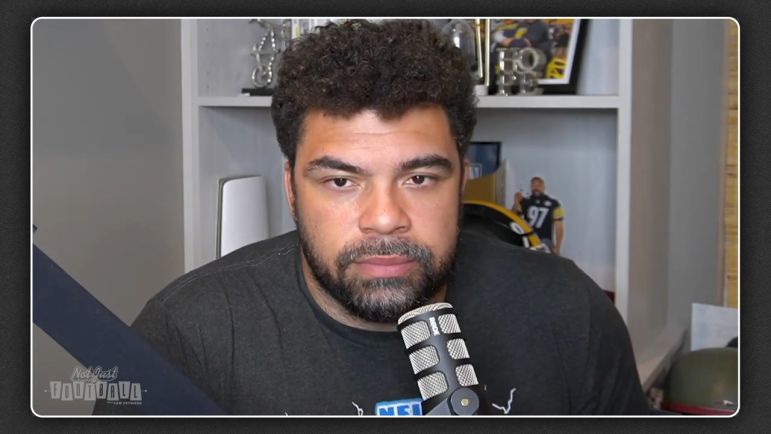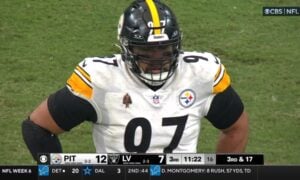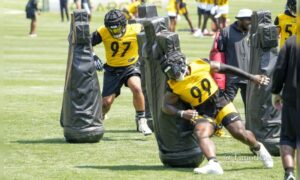The NFL made a decision a long time in the making this offseason by banning the hip-drop tackle, a play where defensive players swivel their legs around their opponent to make a tackle from behind. The rule change has unsurprisingly ruffled some feathers among defensive players around the league, and Pittsburgh Steelers DL Cameron Heyward isn’t a fan of the change.
On his Not Just Football podcast, he said that while he understands where the rule came from, he doesn’t think it’s defined well enough and that the league isn’t doing enough to protect defensive players.
“I understand where the rule came from,” Heyward said.
He said that Bengals-Ravens game from this past season was an example of why he understands it and when Le’Veon Bell got injured on a hip-drop tackle against the Bengals a few years ago, but he still doesn’t like the way the rule is written and thinks it’s going to ultimately be a judgment call. The Steelers were in favor of banning the play because of the hit that injured Bell.
“There were a couple times in that game you saw Mark Andrews take some unfortunate hits. Even vs. us, you saw Le’Veon Bell all those years ago against Vontaze Burfict, that’s what happened, the hip-drop tackle. What I don’t like about this is the ruling of how they’re gonna get there. Because it does not seem like they have a good background of what’s gonna take place. It seems like it’s gonna depend on the ref and what they see, it’s gonna be called. It’s gonna be very interesting for any team to deal with this.”
Heyward questioned how a defensive back is going to be able to bring someone down from behind.
“For a DB, how are you getting this guy on the ground? I just think we’re gonna get to a place where we can’t tackle.”
Heyward said that wham blocks and trap plays where tight ends go after a linebacker’s knees are areas that need to be addressed. He said there needs to be more clarity and a better definition of what the hip-drop tackle is, and looking at the wham and trap blocks or cut blocks are better ways to protect players.
Ultimately, Heyward’s point about the hip-drop being looked at and eliminated over plays like cut and wham and trap blocks is a fair point. There were a number of lower-body injuries suffered as a result of the hip-drop tackle, but they were more prevalent because often, they were occurring to talented offensive players. When a defensive lineman goes down after a cut block, it doesn’t get the same amount of attention as it does when someone is injured as the result of a hip-drop tackle. For the NFL to address one aspect that protects the offense but not potentially dangerous blocks that would help protect the defense is a fair reason for defensive players to be upset over the change.
Like always though, players will adapt and find a new way to make a tackle from behind. While executing a hip-drop tackle will get you a 15-yard penalty, players and coaches will work on adjusting tackling technique and find another way to bring down players when the defender is trailing behind the ball carrier.
It’s definitely frustrating for defensive players who might feel as if they’re being unfairly targeted as the NFL wants to promote offense, but the hip-drop has shown to be the cause for a number of major injuries, including Andrews in the Week 11 game on Thursday Night Football last season, and Bell tearing his ACL after the hit from Burfict, and there’s been a lot more.
The NFL wants eliminate plays that could cause serious lower-body injuries as much as possible, as it’s becoming a major problem in the game, and this was a way for them to do so. Heyward’s frustration is understandable, especially as it really does seem as if it will be a judgment call from the official over what qualifies as a hip-drop tackle and because defensive players have been so unfairly targeted with rule changes over the years, but this is one that at least has the right idea to try and make the game safer.
Whether it actually works is yet to be seen, and it’ll be interesting to see how defenses adapt, but regardless Heyward and other defensive players in the league still have a right to be frustrated over the rule change.








